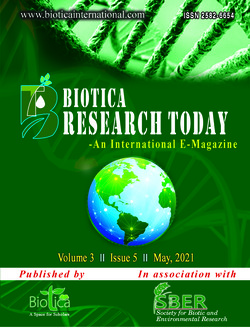
Insects Saprophagy
Nisha Pradeepa K.*
S. Thangapazham Agricultural College, Vasudevanallur, Tenkasi, Tamil Nadu (627 760), India
A. Subash Chandra Bose
S. Thangapazham Agricultural College, Vasudevanallur, Tenkasi, Tamil Nadu (627 760), India
DOI: NIL
Keywords: Decomposers, Dung rollers, Recyclers, Scavengers
Abstract
Insects provide important ecosystem services like Nutrient cycling, decomposition of animal and plant matter and decomposers of corpse. Many insects and other arthropods are important decomposers especially Coleoptera, Diptera, Blattodae (Termites), and few Hymenoptera. These insects are largely responsible to create a layer of humus on the soil that provides an ideal environment for various fungi, microorganisms and bacteria. These organisms produce much of the nitrogen, carbon, and minerals that plants need for growth. Carrion feeders include several beetles, ants, mites, wasps, fly larvae (maggots), and others. These insects occupy the dead body for a short period of time but rapidly consume and/or bury the carcass. Typically, some species of fly are the first to eat the body, but the order of insects that follows is predictable and known as the faunal procession. Insects help humans in eradicating the dead and the decaying matter from human habitations.
Downloads
not found
Reference
Capinera. J.L., 2008. Encyclopedia of Entomology. Vol 4. 2nd Edition. Springer Publishers, pp. 1- 4346.
Meurant, G., 2017. Insect-Fungus Interactions. 14th ed. [ebook] London: The Royal Entomological Society of Society of London, pp. 1-275.
Price, P., Denno, R., Eubanks, M., Finke, D., Kaplan, I., 2011. Insect Ecology: Behavior, Populations and Communities. Cambridge University Press, pp. 1-639.
